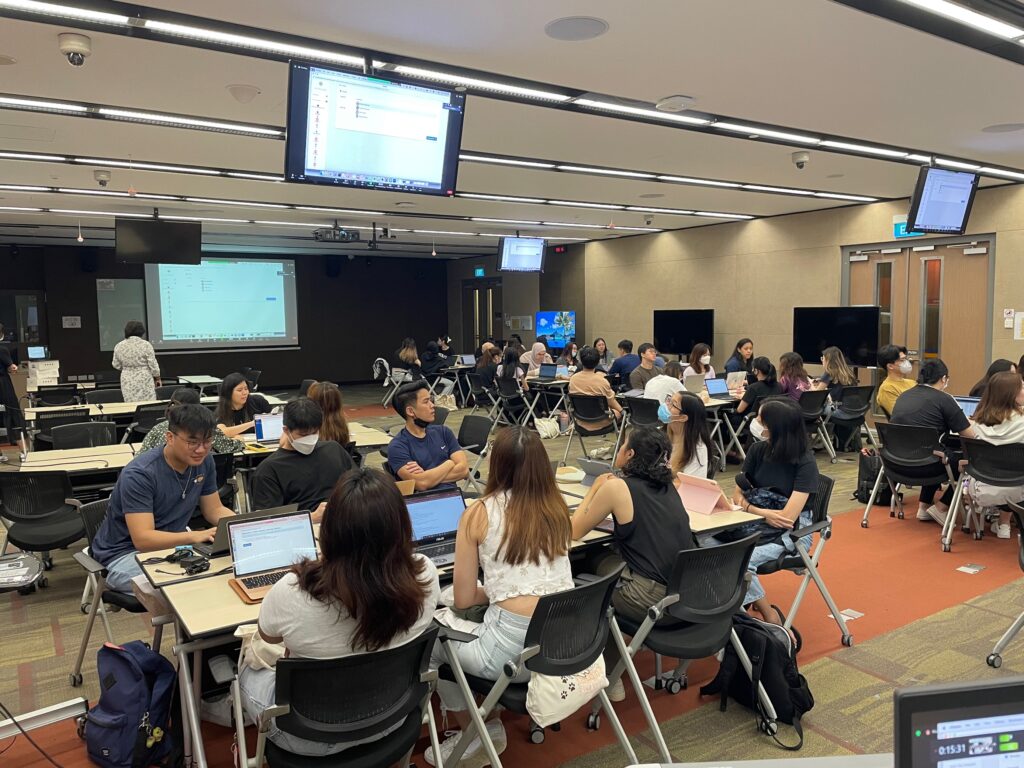Harnessing the power of collective intelligence with the Learning Activity Management System (LAMS)
Leveraging on existing technology and strategies, the teaching team at Alice Lee Centre for Nursing Studies at Yong Loo Lin School of Medicine, National University of Singapore (NUS Nursing) led by A/Prof Jeanette Ignacio piloted a project using team-based learning, supported by the EduTech team at NUS Medicine.
To encourage effective collaborative learning among students, the teaching team at Alice Lee Centre for Nursing Studies at Yong Loo Lin School of Medicine, National University of Singapore (NUS Nursing) led by A/Prof Jeanette Ignacio piloted a team-based learning project.
With support from the EduTech team at NUS Medicine, the team employed the Learning Activity Management System (LAMS) platform, to facilitate collaborative learning for the integrated core module, Pathophysiology, Pharmacology and Nursing Practice II (NUR2125) — a combination of three key topics of Pathophysiology, Pharmacology and Nursing Practice.
As an integrated module for current Year 2 students, the diverse educational backgrounds of these students within the relatively large nursing cohort dictated a need for a strategy that would address their various learning needs, all the while doing this within a collaborative class environment.
Due to the module’s integrated nature – consisting of three component disciplines, the lecturers found it challenging to promote cognitive integration among the students and facilitate collaborative learning at the same time.
However, this was difficult to achieve in a cohort comprising of undergraduate nursing students from different tertiary education backgrounds and unrelated undergraduate degrees. . The diversity in educational backgrounds as well as ages was a challenge that the teaching team wanted to overcome. Hence, the initiation of team-based learning using the LAMS platform was conceptualised.

Students engaged in discussion using the team-based learning platform.
The session aims to tap into each student’s knowledge and understanding of a particular topic, and to diagnose and come up with an action plan for the presented case. Carried out in four phases every session, students are randomly assigned into groups. They begin with tests to prepare themselves with the case, followed by learning how to apply concepts to real-life conditions, and finally, individual reflection, on both the pedagogy and case management process of each session.
An intriguing initiative of the lecturers lies in the first phase of this learning method. Students are given individual and then team readiness assurance tests, with both sets containing the same questions.
According to the lecturers, this allows them to observe student dynamics and how well each student understands the topic, since less-confident students may change their answer when discussing in teams.
A “Burning questions” round then takes place after the team test, giving them the opportunity to clarify concepts with the lecturer, before applying what they have learnt in case management. In the case management portion, they are presented with cases where they have to identify main problems and come up with a course of action.
Around 379 students attended the pilot session, and throughout the session, lecturers observed an improvement in the learning setting.
“The students put effort to think, collaborate and answer questions, which encourages active and deep learning. This is a good pedagogy for healthcare students, as they also focus on collaboration — one of the attributes of becoming a good healthcare professional,” feedbacked Dr Tanushi Roy, Senior Lecturer at NUS Nursing.
Prior to the use of LAMS, case-based collaborative learning was introduced via different strategies, such as a classroom gaming component, Kahoot. While they were riveting at first, students commented that these interactive games did not hold their attention long enough, and teamwork was not thorough. Hence, the usage of LAMS in team-based learning and the comprehensive content planned by the lecturers provided a more conducive collaborative learning environment for the students.
“Team-based learning has provided me with opportunities to collaborate, communicate, and grow alongside my team. I have gained a deeper understanding of the power of collective intelligence and the importance of effective teamwork. This collaborative approach has not only enhanced my ability to work in teams but also fostered a greater sense of understanding the big three concepts of the module,” shared a student.


